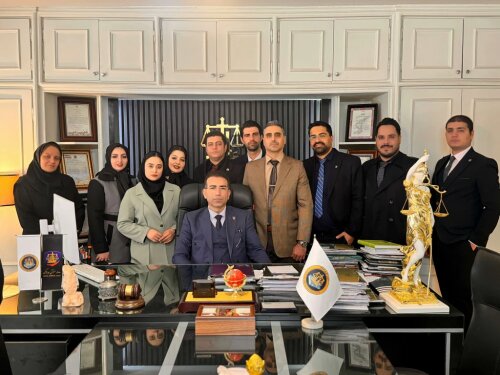Best Housing, Construction & Development Lawyers in Iran
Share your needs with us, get contacted by law firms.
Free. Takes 2 min.
Free Guide to Hiring a Real Estate Lawyer
Or refine your search by selecting a city:
List of the best lawyers in Iran
About Housing, Construction & Development Law in Iran
Iran has a complex legal system governing housing, construction, and development. Real estate laws, building regulations, and zoning ordinances are some of the key aspects that individuals, companies, and institutions must adhere to in these areas.
Why You May Need a Lawyer
You may need legal help in Housing, Construction & Development in Iran for various reasons, such as resolving property disputes, navigating zoning laws, negotiating contracts, obtaining construction permits, or defending against construction defects claims. A lawyer can provide valuable advice and representation to protect your rights and interests.
Local Laws Overview
Key aspects of local laws relevant to Housing, Construction & Development in Iran include property ownership rights, building permits, land use regulations, environmental laws, and construction contracts. Compliance with these laws is essential to avoid legal complications and ensure successful projects.
Frequently Asked Questions
1. Can foreigners own property in Iran?
Foreigners can own property in Iran in designated areas, subject to certain restrictions and regulations. It is advisable to seek legal advice to understand the requirements and procedures involved.
2. What are the penalties for violating building regulations in Iran?
Violating building regulations in Iran can result in fines, demolition orders, or other legal consequences. It is important to comply with building codes and obtain necessary permits to avoid such penalties.
3. How can I resolve a property dispute in Iran?
Property disputes in Iran can be resolved through negotiation, mediation, arbitration, or litigation. Consulting with a lawyer experienced in real estate matters can help you navigate the legal process effectively.
4. What is the process for obtaining a construction permit in Iran?
The process for obtaining a construction permit in Iran involves submitting an application to the relevant authorities, complying with building regulations, obtaining approvals, and paying fees. A lawyer can assist you in navigating this process.
5. Are there any restrictions on land use in Iran?
Iran has zoning laws and regulations that restrict land use for specific purposes, such as residential, commercial, industrial, or agricultural. Understanding these restrictions is crucial when planning development projects.
6. How can I protect my rights as a construction contractor in Iran?
To protect your rights as a construction contractor in Iran, it is advisable to enter into written contracts, comply with construction laws, obtain necessary licenses, and resolve disputes through legal means if necessary.
7. What are the environmental considerations in construction projects in Iran?
Construction projects in Iran must comply with environmental laws and regulations to minimize environmental impact, such as pollution, waste disposal, and resource conservation. Consulting with an environmental law expert can help you address these considerations.
8. Can I challenge a construction defects claim in Iran?
If you are facing a construction defects claim in Iran, you can challenge it by providing evidence to refute the allegations, negotiating a settlement, or seeking legal remedies through arbitration or litigation. A lawyer can help you defend your position effectively.
9. What are the risks of non-compliance with real estate laws in Iran?
Non-compliance with real estate laws in Iran can lead to legal disputes, financial losses, project delays, reputational damage, and other adverse consequences. It is essential to ensure compliance to avoid such risks.
10. How can I protect my interests in a real estate transaction in Iran?
To protect your interests in a real estate transaction in Iran, you should conduct due diligence, review contracts carefully, seek legal advice, negotiate favorable terms, and ensure compliance with legal requirements. Consulting with a real estate lawyer can help safeguard your investment.
Additional Resources
For further information and assistance with Housing, Construction & Development in Iran, you may consider contacting the Ministry of Roads and Urban Development, the Construction Engineering Organization, the Real Estate Registration Office, or local law firms specializing in real estate law.
Next Steps
If you require legal assistance in Housing, Construction & Development in Iran, it is advisable to consult with a qualified lawyer who specializes in real estate law. A lawyer can assess your situation, provide tailored advice, assist in negotiations, represent you in legal proceedings, and help you achieve your objectives effectively.
Lawzana helps you find the best lawyers and law firms in Iran through a curated and pre-screened list of qualified legal professionals. Our platform offers rankings and detailed profiles of attorneys and law firms, allowing you to compare based on practice areas, including Housing, Construction & Development, experience, and client feedback.
Each profile includes a description of the firm's areas of practice, client reviews, team members and partners, year of establishment, spoken languages, office locations, contact information, social media presence, and any published articles or resources. Most firms on our platform speak English and are experienced in both local and international legal matters.
Get a quote from top-rated law firms in Iran — quickly, securely, and without unnecessary hassle.
Disclaimer:
The information provided on this page is for general informational purposes only and does not constitute legal advice. While we strive to ensure the accuracy and relevance of the content, legal information may change over time, and interpretations of the law can vary. You should always consult with a qualified legal professional for advice specific to your situation.
We disclaim all liability for actions taken or not taken based on the content of this page. If you believe any information is incorrect or outdated, please contact us, and we will review and update it where appropriate.
Browse housing, construction & development law firms by city in Iran
Refine your search by selecting a city.

















